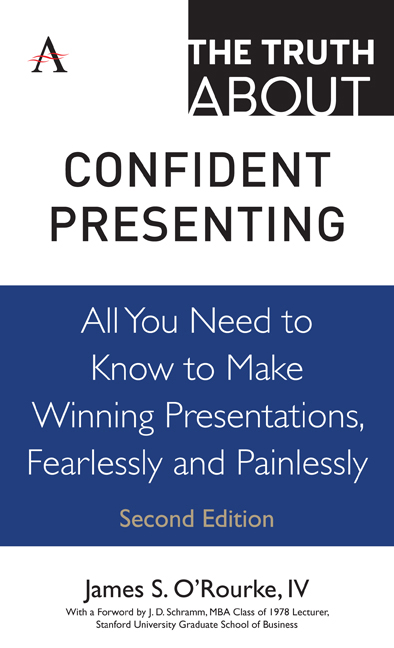 The Truth about Confident Presenting
The Truth about Confident Presenting Book contents
- Frontmatter
- Contents
- Foreword
- Introduction
- Part I Some Initial Truths
- Part II The Truth About Getting Ready to Speak
- Part III The Truth About What Makes People Listen
- Part IV The Truth About Developing Support for Your Presentation
- Truth 19 Develop support for your presentation
- Truth 20 Understand the power of your content
- Truth 21 The kinds and quality of evidence matter to your audience
- Truth 22 Structure can help carry an inexperienced speaker
- Truth 23 Find support for your presentation
- Truth 24 Use the Internet to support your presentation
- Part V The Truth About Getting Up to Speak
- Part VI The Truth About Managing Anxiety
- Part VII The Truth About Nonverbal Communication
- Part VIII The Truth About Visual Aids
- Part IX The Truth About Handling an Audience
- Part X The Truth About What Makes a Presentation Work
- References
- Acknowledgments
- About the Author
Truth 24 - Use the Internet to support your presentation
from Part IV - The Truth About Developing Support for Your Presentation
- Frontmatter
- Contents
- Foreword
- Introduction
- Part I Some Initial Truths
- Part II The Truth About Getting Ready to Speak
- Part III The Truth About What Makes People Listen
- Part IV The Truth About Developing Support for Your Presentation
- Truth 19 Develop support for your presentation
- Truth 20 Understand the power of your content
- Truth 21 The kinds and quality of evidence matter to your audience
- Truth 22 Structure can help carry an inexperienced speaker
- Truth 23 Find support for your presentation
- Truth 24 Use the Internet to support your presentation
- Part V The Truth About Getting Up to Speak
- Part VI The Truth About Managing Anxiety
- Part VII The Truth About Nonverbal Communication
- Part VIII The Truth About Visual Aids
- Part IX The Truth About Handling an Audience
- Part X The Truth About What Makes a Presentation Work
- References
- Acknowledgments
- About the Author
Summary
The Internet has been a remarkably useful tool for nearly four decades, both for business people and for others doing research or curious about subjects they'd like to know more about. Hundreds of millions of computers, linked together worldwide have instantaneous access to information about nearly any subject you can imagine.
The Internet, however, is not without its problems. For one thing, the information it contains is unorganized. Stephen Hayes, a university business services librarian, once described the Internet as “a library with all the books on the floor.” It's no ordinary library, either. Literally anyone can set up a home page, buy a Web Site address and begin doing business on the Internet. So, a speechwriter in search of information can— and often does— find inaccurate or biased information alongside valuable content on the Internet. “There's little we can do to verify the accuracy of the information contained in most sites on the World Wide Web,” said Mr. Hayes. “Thus, each of us should approach what we find with appropriate caution and skepticism— just as we would a print source.”
The World Wide Web— the most heavily trafficked portion of the Internet— is organized broadly into four categories of sites: government, educational, commercial and not-for-profit. Internet addresses, known as URLs (universal resource locators), reflect the specific category within the letters they contain. Corporate home pages (usually ending in ”.com”) will tell you things about a company that they want you to know, such as where to buy their products, how their stock price is doing and how to apply for employment in the company. In many ways, it's simply another form of advertising or “owned media.”
Government-sponsored Web sites (ending in ”.gov”) provide large categories of information, including tax payer supported research, census data, international trade and banking data and regulatory information. Educational institutions, such as colleges 24 and universities, sponsor Web sites (ending in ”.edu”) that permit students, alumni, prospective applicants and others to find out more about everything from research results to academic curricula to how the varsity lacrosse team is doing.
Finally, Web sites sponsored by not-for-profit organizations and nongovernmental organizations (usually ending in ”.org”), such as the United Nations, American Red Cross, Goodwill Industries and National Public Radio, offer everything from program schedules and broadcast transcripts to detailed descriptions of current activities in their organizations.
- Type
- Chapter
- Information
- The Truth about Confident PresentingAll You Need To Know To Make Winning Presentations, Fearlessly And Painlessly, pp. 93 - 98Publisher: Anthem PressPrint publication year: 2019


